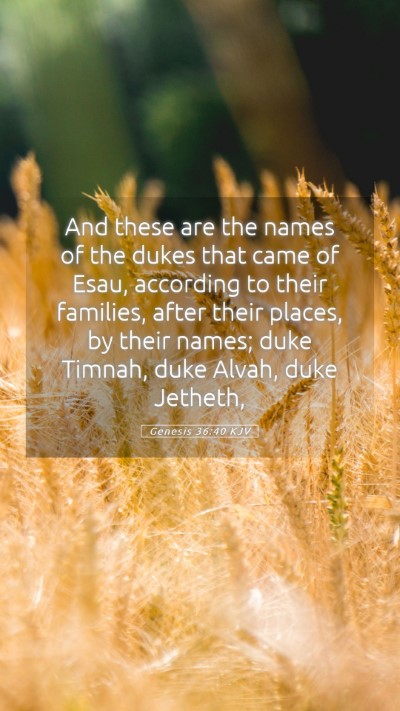Bible Verse Meaning of Genesis 36:40
Genesis 36:40 reads: "And these are the names of the dukes that came of Esau, according to their families, after their places, by their names; duke Timnah, duke Alvah, duke Jetheth." This verse serves as part of a genealogy that highlights the descendants of Esau, providing critical historical context to the lineage that existed outside of Israel. Below is a synthesis of insights derived from public domain commentaries, which present a deeper understanding of this scripture.
Understanding the Context
The genealogical accounts in Genesis are significant for several reasons:
- Historical Narrative: This passage continues the narrative of Esau's family, contrasting sharply with the household of Jacob, and establishing origins for various tribes (Matthew Henry).
- Divine Purpose: The scripture underscores God's purpose in the unfolding of human history through the lineage of Abraham, Isaac, and Esau, steering the events that would touch nations and their destinies (Albert Barnes).
- Importance of Tribes: Identifying the dukes shows the fragmented nature of the descendants of Esau, leading to important later implications in the narrative of the Israelites and their neighbors (Adam Clarke).
Interpretation of Key Terms
The mention of "dukes" refers to leaders of clans or tribes, indicating the status and influence of Esau’s descendants:
- Duke: A title of nobility, suggesting that the lineage of Esau established significant power structures in the regions they inhabited.
- Families: This term implies a network of relationships, indicating that the descendants were organized into distinct groups or tribes.
- Names: The emphasis on names highlights identity, legacy, and the importance of family heritage within the socio-cultural context (Matthew Henry).
Lessons from Genesis 36:40
This verse offers various lessons applicable to modern readers:
- Understanding our Lineage: It encourages individuals to reflect on their own heritage and the historical implications of their ancestors' choices (Albert Barnes).
- The Nature of Leadership: The titles of dukes show that leadership comes with responsibility and legacy, something that bears significance in all walks of life today.
- God's Sovereignty: This passage serves as a reminder of God’s overarching plan and sovereignty over nations and generations, urging readers to trust in His divine purpose (Adam Clarke).
Commentary Summary
The following is a condensed version of commentary insights related to Genesis 36:40:
- Matthew Henry: Henry emphasizes the continuity in the narrative and how the lineage connects back to deeper themes in Scripture, like God’s faithfulness and human dynamics.
- Albert Barnes: Barnes focuses on the historical significance of Esau and the nations that emerged from his lineage, providing insights into the socio-political landscape of Biblical times.
- Adam Clarke: Clarke offers a critical view of the names listed, suggesting possible meanings and interpretations that reflect the characteristics or historical narratives of these tribes.
Related Bible Cross References
For better understanding and insight, consider these related verses:
- Genesis 25:30: The birthright sale between Jacob and Esau.
- Genesis 27:41: Esau’s animosity towards Jacob, setting the stage for future interactions.
- Malachi 1:2-3: A prophetic declaration concerning God’s love for Jacob and His hatred for Esau, emphasizing the divine preference in the unfolding of history.
Application Today
This verse can be a segway into deeper Bible study discussions about:
- How to interpret Bible verses regarding family legacy and identity.
- The implications of historical context in understanding difficult Bible passages.
- The nature of leadership and its ramifications in faith communities and wider society.
Conclusion
Genesis 36:40 serves as a pivotal verse in understanding the genealogical narratives within Scripture. The names and titles reflected demonstrate how Scripture provides a foundation for comprehending the interactions between different tribes, nations, and the overall divine narrative of redemption. Whether studying in groups or individually, engaging deeply with these verses and their commentaries will enhance one's Bible study skills and understanding of Scripture.


